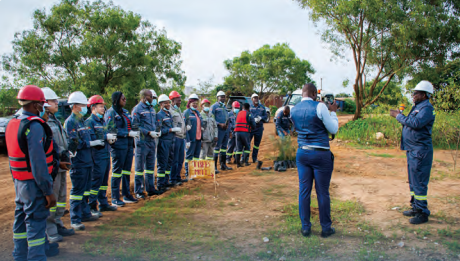Jinchuan Group International Resources Co. Ltd. (JCI), majority owned by Jinchuan Group, is the group's flagship company for the development of international mining and mineral resources operations.
JCI has mining operations in the Chibuluma South Mine (Zambia), Ruashi Mine, Kinsenda Mine, Musonoi Project and Lubembe Project in the Democratic Republic of the Congo.
Pursuing sustainable development, JCI is committed to the effective management of safety, health, environment, and community relations as an integral part of its business. All of its sites and projects adhere to a strict environmental management system that comprehensively protects the environment and the local communities.

Arbor Day event at Ruashi Mine
Biodiversity and land provide food, fuel, and freshwater that are vital to production while also mitigating the effects of climate change and fundamentally supporting economic development. JCI recognizes the importance of biodiversity conservation and is dedicated to minimizing the risks and impact of production activities on biodiversity. It has taken actions such as afforestation, legal logging, and setting up emergency procedures for soil contamination to contribute to global biodiversity conservation.
Biodiversity
The overseas mines of Jinchuan carry out biodiversity conservation initiatives to enhance ecosystem diversity and stability based on local conditions, and are committed to making positive impact on the mine sites and their surroundings.
To protect biodiversity, Ruashi Mine organizes annual reforestation activities and plants thousands of trees. JCI also invites local students to plant trees alongside our employees to raise public awareness of biodiversity conservation.
Kinsenda Mine is committed to fighting deforestation, water pollution, and erosion to protect local flora and fauna.
Soil conservation
Ruashi Mine has already established the Soil Pollution Prevention and Remediation Procedure to comply with the ISO14001:2015 standard, which provides guidelines for the storage and disposal of fuels and lubricants, as well as the maintenance of fuel and lubricant tanks, pipelines, and fuel transfer areas.
In case of soil contamination, Ruashi Mine is expected to bioremediate the contaminated soil using Mono-Ammonium Phosphate and water or microorganisms.








